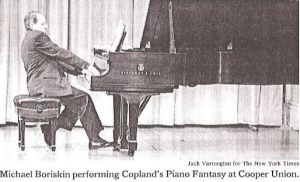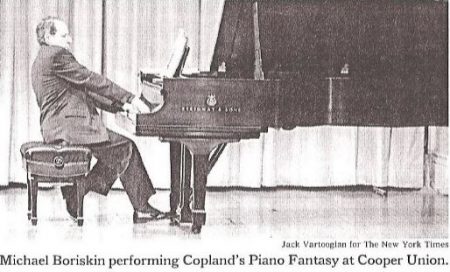Arts | MUSIC REVIEW
MUSIC REVIEW; Perle Surrounds Copland In a Program of Contrasts

Before he performed Copland’s sprawling Piano Fantasy in the Great Hall at Cooper Union on Thursday night, the pianist Michael Boriskin informed the audience that William Masselos had given the world premiere of the work in New York 44 years before, to the day.
Mr. Boriskin had not known of the coincidence when he scheduled this recital of works by Copland and George Perle, presented by Cooper Arts. It was a good omen, though, for he gave a remarkable performance of Copland’s extraordinary fantasy, which, inexplicably, is seldom heard.
Besides having the technical facility to dispatch this imposingly difficult score, Mr. Boriskin brought a special affinity for the composer to bear, for he is artistic director of Copland House, a creative center for American music based at Copland’s former home in the Hudson Valley town of Cortlandt.
Copland worked intensely on the fantasy from 1955 to 1957. Serialism had become the vogue among intellectual American composers. At once intrigued and intimidated by 12-tone technique, Copland freely adapted elements from it in this work, fashioning a hybrid harmonic language that abounds with confidence. Passages tinged with serialism still have Copland’s distinctive sonority; passages that are grounded in tonality still have a spiky astringency.
The boldest aspect of the work is not its harmonic language but its structure. The fantasy evolves over 30 minutes. Though on the surface the music is rhapsodic and restless, with scant repetition, the fantasy comes across as an organic entity. At least it did in Mr. Boriskin’s gripping, spontaneous yet tautly controlled performance.
It was a fascinating idea to frame the Copland with Mr. Perle’s 12 études. The Six Études (1973-76) preceded the fantasy, and the Six New Études (1984) came after: all told, including the Copland, more than 60 minutes of music, which Mr. Boriskin played without an intermission and without flagging.
Mr. Perle adapts the 12-tone technique in these works in an ingenious way that gives the music both rigor and freedom.
Heard alongside the Copland fantasy, Mr. Perle’s études could be considered the less radical music. There is a Neo-Classical quality to it; indeed the New Études have titles like ”Praeludium” and ”Gigue.” The textures are lucid, the development logical. In comparison Copland’s fantasy is utterly wild. The hushed, slow, prolonged final section seems less a calming coda than a needed period of recuperation after an exhausting adventure.
The entire recital was an adventure for the audience, with Mr. Boriskin as our fearless trail guide.


